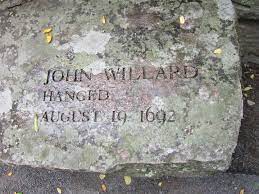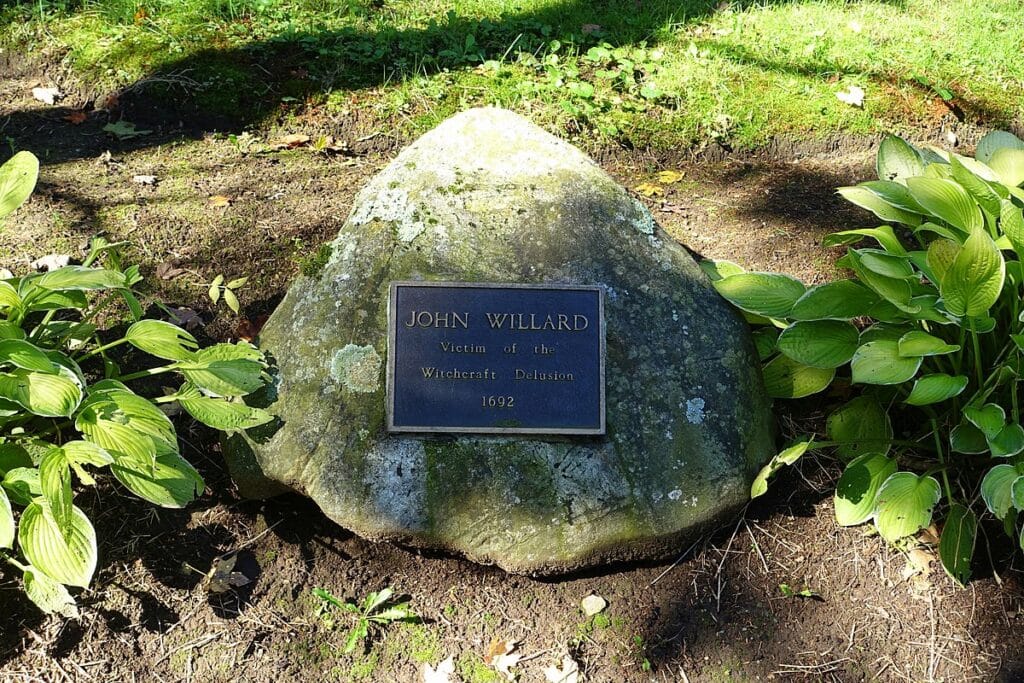John Willard was one of the accused and executed during the Salem Witch Trials. He maintained his innocence, and despite the unfair nature of the trial, he seemed to maintain his composure well.
Unfortunately, the allowance of spectral evidence in the trial made it extremely hard to prove his innocence.
At the time of the trials, Willard was a constable and had brought the accused before the court. During this time, he began not to believe the accusations that were being put against the accused, and he began to seriously doubt the integrity of the young women making the accusations. In response, Ann Putnam Jr accused him of witchcraft.
On August 19, 1692, he was hanged, along with John Proctor, George Burroughs, George Jacobs, Sr., and Martha Carrier.
The Putnam and Wilkins Families
To understand John Willard's fate at the Salem Witch Trials, it is important to understand his relationships with those who would later accuse him of witchcraft.
John met and married Margaret Wilkins, which made her parents uneasy. The Wilkins family endured a terrible business deal that would leave the family in a rough financial situation.
Although they managed to climb out of the situation, it left the patriarchs of the family sour with land speculation, and they believed that farming was a much more secure way to make a living. John was not a farmer and worked in land speculation.
His chosen profession worried Margaret's family. This relationship would play a pivotal role in the accusations against John. One of the accusations was that he was physically abusive towards his wife. These accusations would come from the Wilkins family.
The second relationship that needs to be looked at is his relationship with the Putnam family. The Putnam family would be home to the main accuser, Ann.
When John Willard arrived in Salem village, he worked as a hired hand for the Putnams. He did many things for them, which included looking after the young children who lived there. Ann Putnam Sr. had recently given birth to a baby girl named Sarah, and after a few months, the baby girl died suddenly, which devastated the family. Despite child death being common at the time, John Willard would be accused by the family of her death.
The Putnam family and the Wilkins family would be one of the closest families in Salem. They had banded together at one point to try and make their own church in Salem Village. They both also shared a dislike for John Willard.
Accusations
Towards the end of April, after John Willard had quit his post as a constable and publicly doubted the girls' accusations. Ironically, just after he publicly doubted the accusations, Ann Putnam Jr. began to see visions of John Willard's specter.
Willard's specter would reveal to her his culpability in several murders. Ann Jr. claimed that she told the apparition of John Willard, "I am very sorry to see you so. You were the one that helped to tend me, and now you have come to afflict me."
During her testimony, she would claim that Willard "sett upon me most dreadfully" and had admitted to her that "he had whiped my little sister Sarah to death and he would whip me to death if I would not write in his book."
Ann Jr. would later see the apparition of her dead sister Sarah, who was "crying out for vengeance against John Willard," along with the specter of "John Wilkins first wife," who also declared that Willard had caused her death.
After hearing about these disturbing reports, Willard would seek help from his wife's grandfather, Bray Wilkins. Wilkins would later testify that Willard, after Ann Jr. began to accuse him, "came my house greatly troubled" and wanted him and other villagers to pray for him. Wilkins would tell his grandson-in-law that, unfortunately, he was on his way out for business, but if Willard would come home before night, then he would pray with him.
Willard, however, was unable to make it before night, and Wilkins would not honor the request for prayers. On Tuesday, May 3, 1692, Willard asked his uncle-in-law Henry Wilkins (one of Bray's sons) to accompany him to Boston for election week. Henry's Son, Daniel Wilkins, who was seeing Mercy Lewis at the time, warned his father not to go with Willard, saying, "It would be well if Willard were hanged."
Though he was taken aback by the comment, Henry Wilkins decided to go with Willard anyway.
At the same time, Willard and Henry Wilkins were planning on going to Boston. Bray Wilkins had also made plans to travel there and was staying at his brother-in-law's house. Typically, many family members would meet there for dinner, and on one of those nights, John Willard and Henry Wilkins would arrive. Upon Willard's entry to the home, Bray would later testify that "Willard looked upon me in such a sort as I have never before discerned in anybody."
Bray continued to suffer painful attacks throughout the day. "I cannot express the misery I was in, for my water was suddenly stopped, and I had no benefit of nature but was like a man on a rack," he told his wife. "I am afraid that Willard has done me wrong." Meanwhile, in Salem Village, Daniel Wilkins had also fallen ill. Dr. William Griggs, who was attending young Daniel, "affirmed that his sickness was by some preternatural cause, and would make no application of any physic."
Mercy Lewis, who was also there, "affirmed that she saw the apparition of John Willard afflicting Daniel. Quickly came Ann Putnam Jr., who also saw the same apparition attacking Daniel. Soon after this episode, Bray's son Benjamin Wilkins Sr. took legal action and charged John Willard with afflicting Bray and Daniel Wilkins.
An Arrest warrant would soon be issued for John Willard.
On May 11, 1692, a warrant was issued for the arrest of John Willard. John Putnam Jr, a constable who would search for Willard, reported that "I went to the house of the usual abode of John Willard and made a search for him, and in several other houses and places but could not find him." John Willard had fled. Willard had escaped to Lancaster. After Willard's escape, Bray Wilkins returned to his home in Salem Village.
Once Wilkins arrived home, some friends came to see him, including the afflicted Mercy Lewis. Lewis told Wilkins that she saw the apparition of John Willard on Wilkins' belly. Upon hearing this, Wilkins stated that he was in "grievous pain in the small of my belly." Lewis also stated that she saw Willard's apparition attacking Daniel Wilkins, and "John Willard tells me he will kill him within two days." Mercy's prediction came true, and two days later, on May 16, 1692, Daniel Wilkins died.
A second arrest warrant was issued.
A short time afterward, constable John Putnam Jr. would capture John Willard attending to his meadows in Lancaster and bring him back to Salem Village.

Trial
While it probably would not have mattered, the fact that John Willard had fled did not help his case as it was used against him.
On May 18, 1692, the magistrate began chastising Willard for running away. He said, "That you were fled from Authority....is an acknowledgment of guilt....but yet notwithstanding, we require you to confess the truth in this matter."
Willard admitted that he believed "by my withdrawing, it might be better" but also proclaimed that he was innocent.
The magistrates confronted him with testimonies not only from the current afflictions that were happening in the village but also the dreadful murders he had been charged with, reading to him statements from Mercy Lewis, Ann Putnam Jr., and Susannah Sheldon.
Other witnesses would also come forward and attack his character. Benjamin Wilkins Sr testified that Willard "abused his wife much & broke sticks about her in the beating of her." Another man stated that Willard was "very cruel to poor creatures." After hearing this, Willard asked that his wife be called so that she can refute the charges. However, the justices denied his request.
The justices next employed physical tests. When Susannah Shelton was asked to approach Willard, she fell down immediately and explained that she could not go towards Willard because "the black man stood between us."
Willard then took her hand, which drew no effect from Susannah.
Next, Mary Warren was brought to Willard in a "great fit." he then clasped his hand upon her arm, and she recovered from her fits. Willard, noticing the contradiction, asked the justices, "Why....was it not before so with Susannah Sheldon?"
Those standing by would answer his question by claiming, "Because...you did not clasp your hand before."
The judges then asked John Willard to recite the Lord's Prayer (It was a belief that a witch would not be able to do it without messing up). Willard was unable to quote the Lord's Prayer, which caused the judges to believe he was a witch. (George Burroughs quoted the Lord's Prayer perfectly on the gallows but was still hanged.)
The court sentenced John Willard to death, and on August 19, 1692, while maintaining his innocence, he was hung and then buried in a shallow grave.

<- Return to the List of People Involved in the Salem Witch Trials
